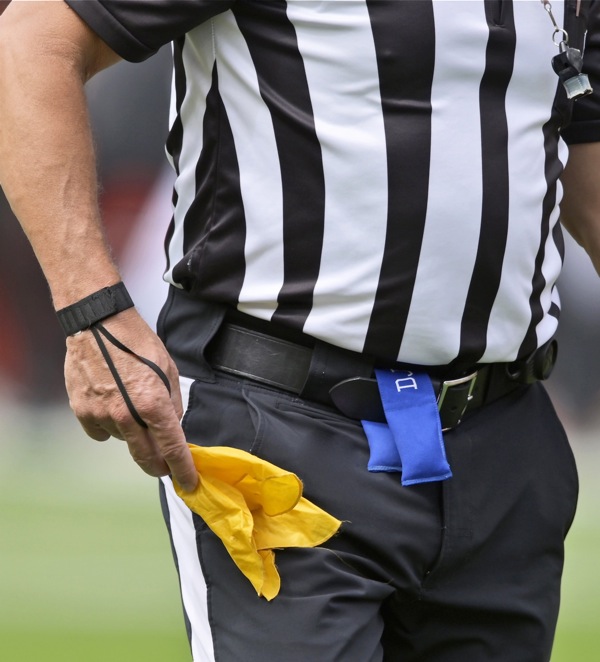It had its moments in the first half, and it certainly had fans on the edge of their seats at the end. A highly entertaining game compared to LSU-Oklahoma, what magnified the Ohio State-Clemson game was the tired hypocrisy of modern officiating and how we used to claim…that the players should determine the outcome.
 Even in the rain and overcast the sun did come up this morning. That said, meeting the day after the night before was a bitter pill for Ohio State football fans – the Buckeyes’ 29-23 playoff loss to Clemson an example of ripping defeat from the jaws of victory, and without question hinging on the impact of two questionable calls – the targeting call on Shaun Wade in the first half that flipped momentum and led to the Tigers first touchdown.
Even in the rain and overcast the sun did come up this morning. That said, meeting the day after the night before was a bitter pill for Ohio State football fans – the Buckeyes’ 29-23 playoff loss to Clemson an example of ripping defeat from the jaws of victory, and without question hinging on the impact of two questionable calls – the targeting call on Shaun Wade in the first half that flipped momentum and led to the Tigers first touchdown.
And, the second half fumble recovery and return for a touchdown that was ruled an incomplete pass – a call that denied Ohio State what would have been either the tying, or winning touchdown.
I suppose this will draw the ire of more than few football officials, but the rule about targeting is flawed from its inception. Meaning, it takes two to tango, and there’s no question that Trevor Lawrence dipped his head into the helmet path of Shaun Wade. Did Wade hit him high? Yes. Did he intend to do damage. You bet, it’s football. Was his head involved? Without a doubt.
But officials have been asked to do more than they’re mortally capable of doing. In the blink of an eye they have to make that call – in real time. And the call looks better in real time than it does in slow motion. Was there helmet to helmet contact? Absolutely, but I still question the rule and any official who looks at that on slow motion and does not take in account Trevor Lawrence sharing responsibility. Because, when you dip you’re head you’re no longer defenseless. You’re defending yourself.
Similarly, in the Penn State-Memphis game earlier in the day the stripes totally missed (didn’t even see it) and had to reverse it from the replay. Totally different call, and a totally different responsibility on the officials to actually see it in real time. It happened 15 feet from the sideline official, and between him and the back judge. Neither saw the obvious penalty, which further raises the question of whether the game has simply passed by human capability.
We’ve made officiating so hard (because of interpretation) that it’s impossible now for men and women to make the kind of judgments regarding what constitutes a “football move” in real time, as opposed to what you see in slow motion? In the case of the Jordan Fuller’s recovery of the fumble and subsequent touchdown against Clemson, there’s no question that the receiver had possession for three steps – had it in both hands – then he dropped the ball. But who can see that perfectly from a given angle of view? Face it, making those calls are much luck as it is skill.
And after the fact, does it not look better to call it in real time (as they did) and let it stand…as opposed to the second guessing that comes with every time slow motion is invoked? Translation: You can see whatever you try to see in slow motion.
Conclusion: As a former official I’m pretty sure that the game was better officiated before instant replay – before the obsession with “getting it right” made for four-hour games and more questions after review than before. This has become the new Pandora’s box!
 And major league umpires defend video review (because they’re afraid not to) because many claim, “above everything else, we want to get it right.” I don’t believe a word of that. Human beings have their pride, and care as much about the dignity of the position and professional respect than they do about the cultural demand for ‘right’. And the pressure of video review does nothing more than make a bad situation worse.
And major league umpires defend video review (because they’re afraid not to) because many claim, “above everything else, we want to get it right.” I don’t believe a word of that. Human beings have their pride, and care as much about the dignity of the position and professional respect than they do about the cultural demand for ‘right’. And the pressure of video review does nothing more than make a bad situation worse.
Did officiating cost Ohio State the win over Clemson? I’ve never been a shill regarding the outcome of Buckeye games, even though I’m an alum. But the Shaun Wade call changed the game and the emotional level of both teams, unquestionably. Ohio State had them on the ropes and video review totally gave Clemson a second life.
The fumble call…looked however you wanted to see it. Officiating analyst Bill Lemonnier, a former Big Ten official, said they got both calls right; but Lemonnier was covering the butts of his brethren, who by the letter of rules currently governing the game, are put in a position of helplessness. You’re damned if you do, and you’re damned if you don’t.
Even if you didn’t care who won Saturday night’s game the fact of the matter is this. Officiating used to be better – for the sake of expectation, implementation, and reputation – and it’ll never be that good again.


